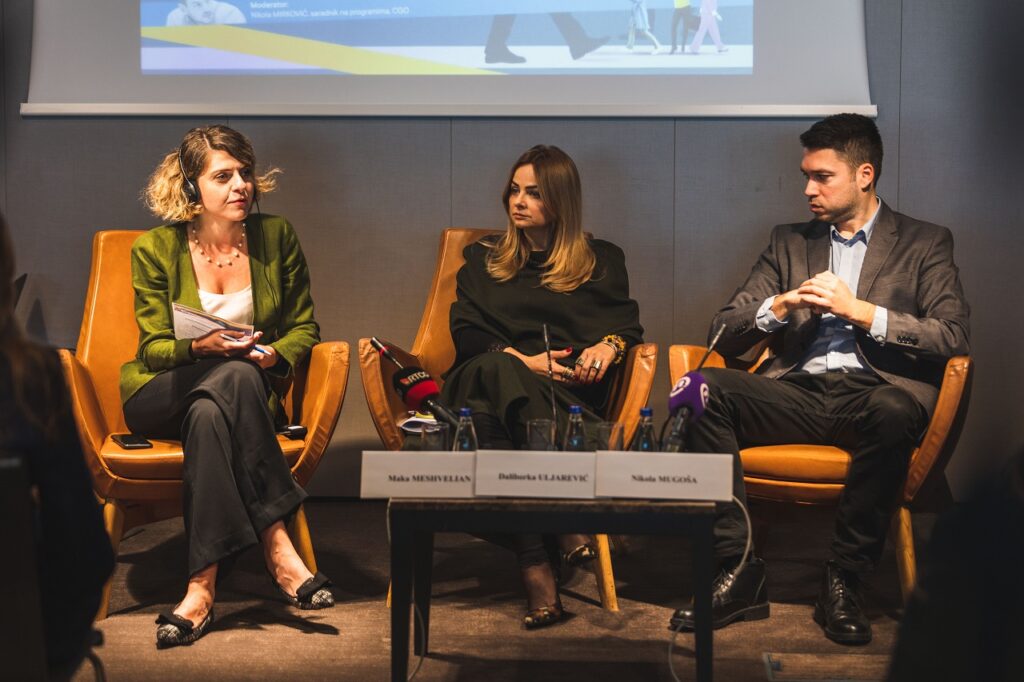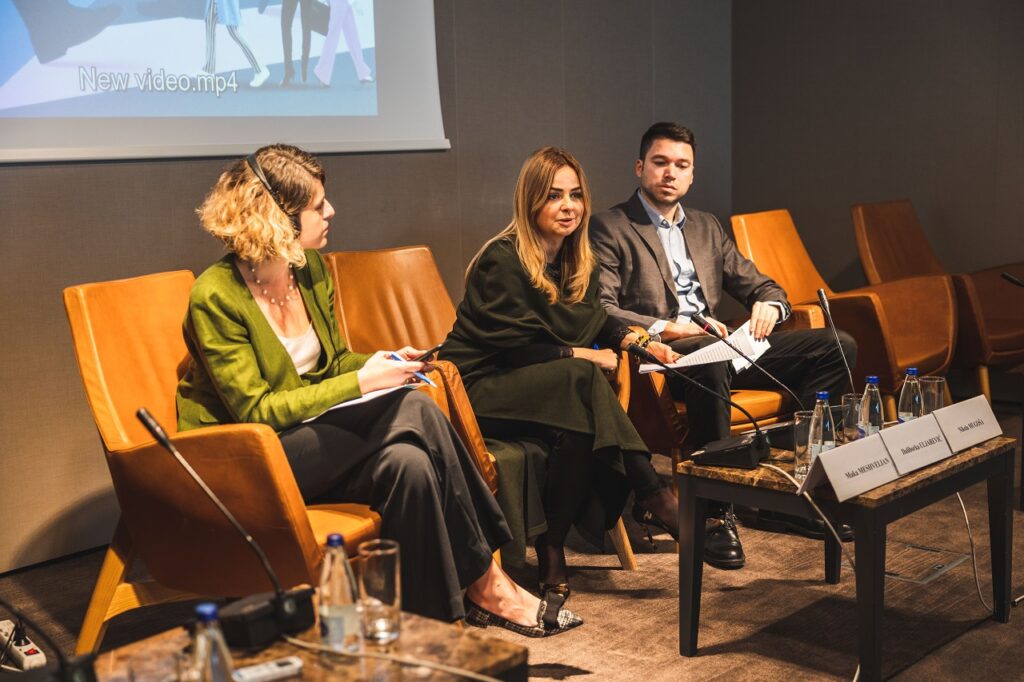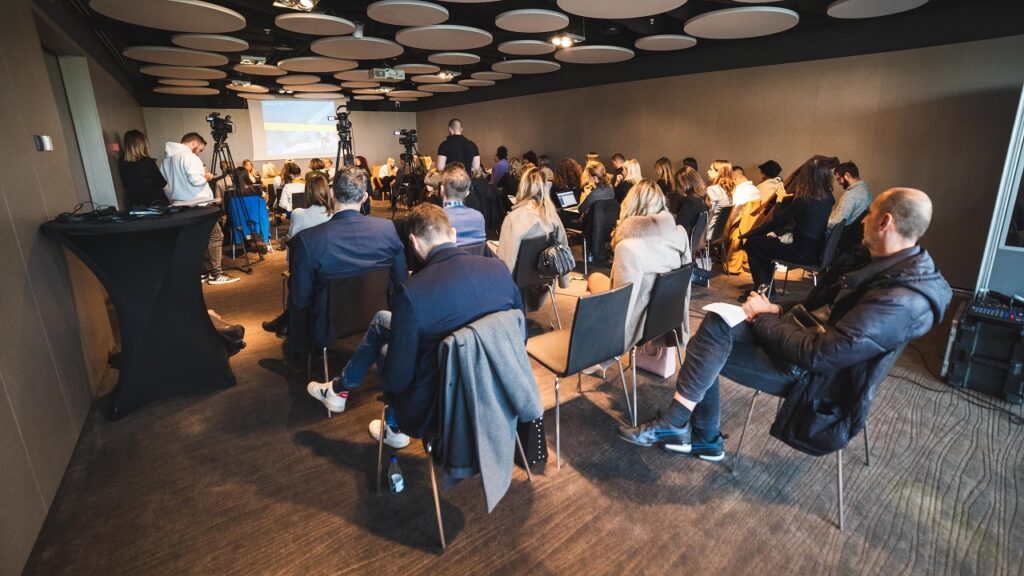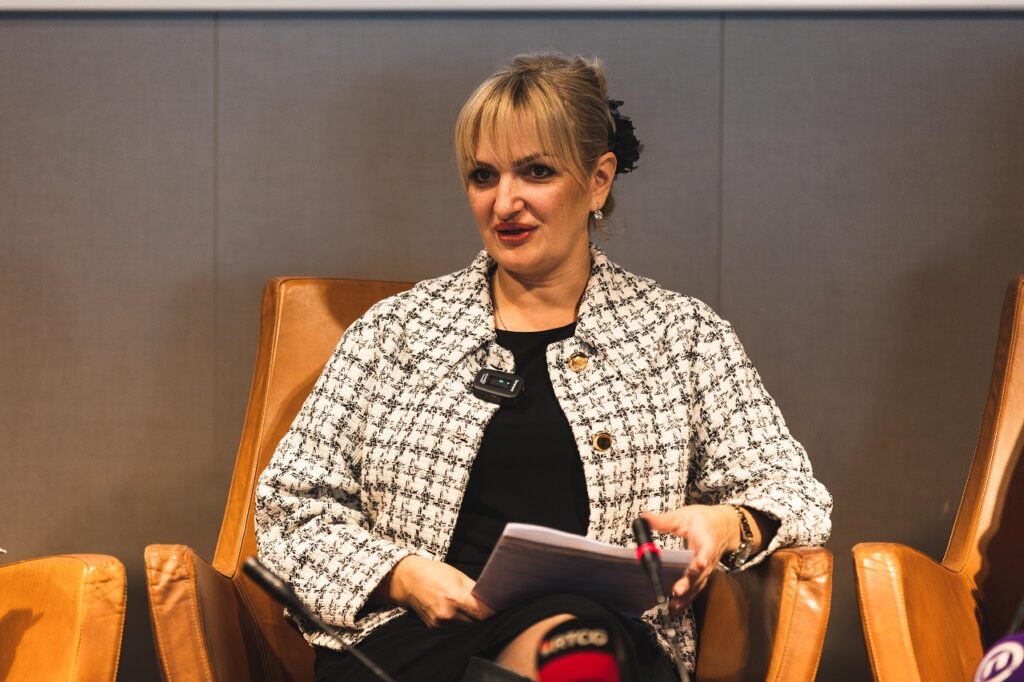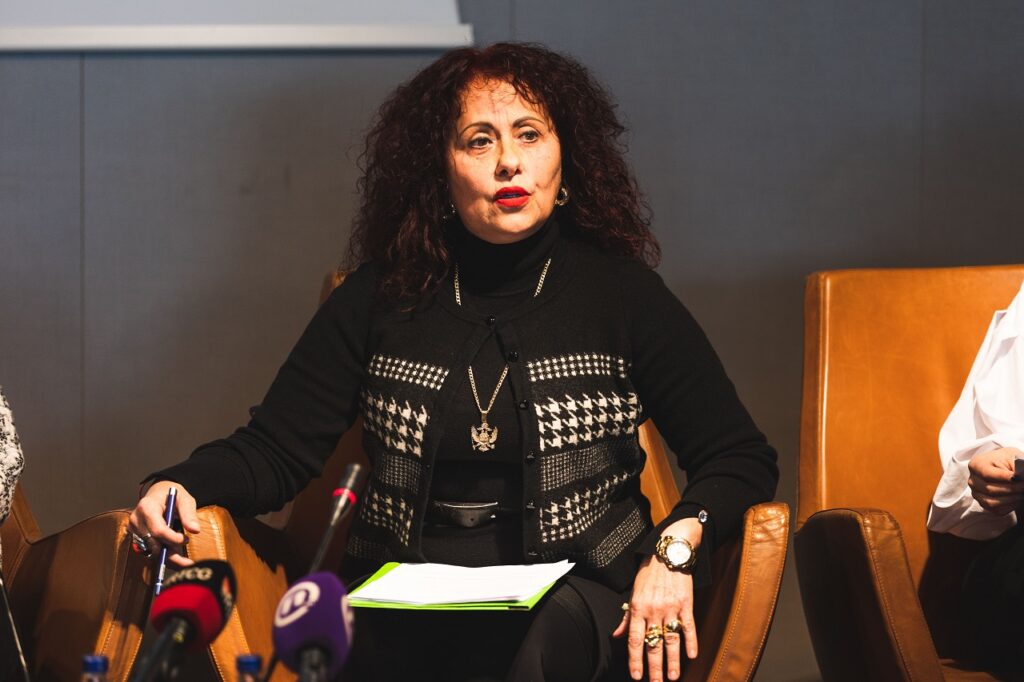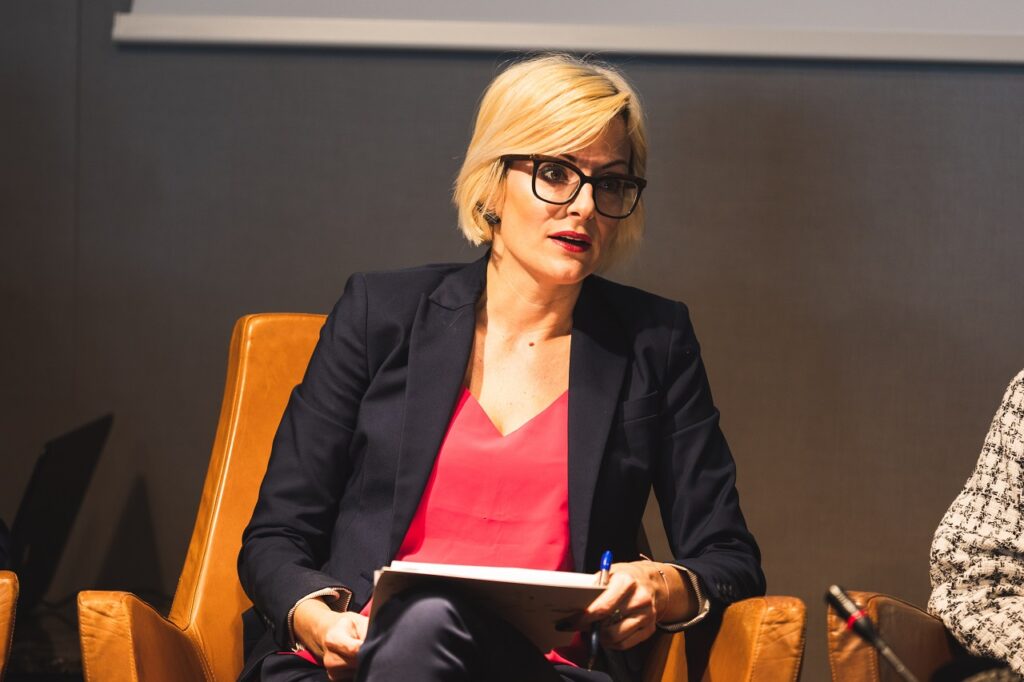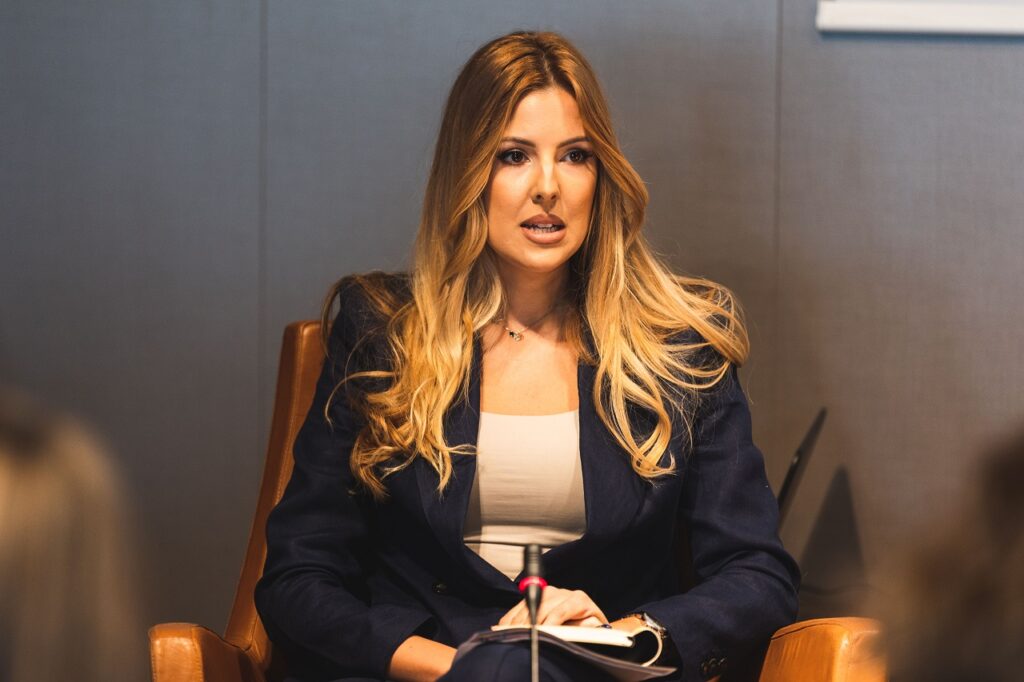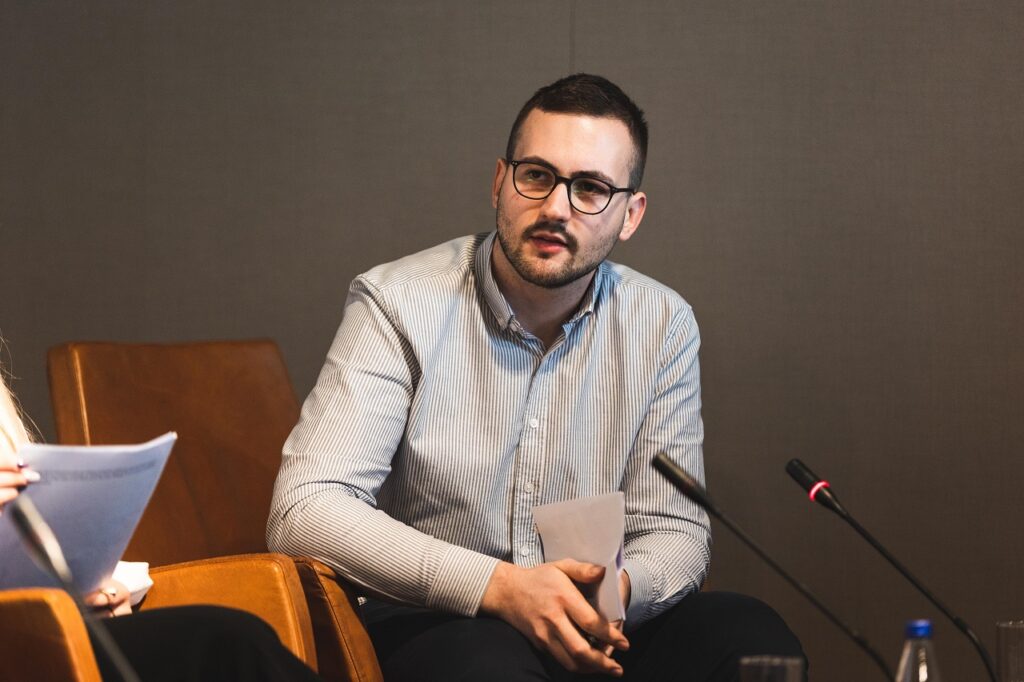The recently concluded local elections were marked by a dominant male narrative and the marginalization of women in the media, with underlined misogyny on social media towards the prominent female holders of electoral lists, but also an unprecedented violation of the legal norm on quotas for the less represented gender. There are no simple solutions for solving problems in this area and for developing more effective political participation of women, and this requires an organized and systematic effort by numerous actors, and it is a positive outcome that women in the public sphere are getting stronger and demonstrating that they can take responsibility regardless of all obstacles, it was said during the conference “Monitoring the 2022 local elections in Montenegro from a gender perspective”, organized today by the Centre for Civic Education (CCE), with the support of the National Democratic Institute (NDI).
Daliborka ULJAREVIĆ, Executive Director of the CCE, said that the Montenegrin environment is not supportive of more effective participation of women in politics. “That is emphasized both by the flagrant violation of the law that we witnessed during the past local elections when it comes to quotas for the underrepresented gender, which did not induce a significant reaction, and also the findings of the CCE and the Damar agency’s research. When asked directly whether women were represented equally or in the minimum legal percentage of 30% on electoral lists in 14 municipalities where elections were held, more than a third (36.7%) believed that they were, less than a third (31.6%) that they were not, and there is an approximate number of those who cannot make a stance on this issue (31.7%). A similar perception exists when it comes to the representation of women in the campaign, even though they were completely in the background compared to the men. As expected, men are the ones who have a dominant perception that the situation in the political representation of women is satisfactory, but also those with a lower educational level,” said Uljarević. “There is no simple solution for the practical political participation of women, but it requires a comprehensive approach of numerous actors – both from institutions, political parties and civil society,” she assessed.
Nikola Mugoša, the President of the State Election Commission (SEC), referred to the local elections held in October 2022 through the legislative aspect, emphasizing that in certain municipalities the representation of women was not even at the legally guaranteed minimum. “This is particularly worrying considering that the quota system in our electoral legislation has been applied for more than 10 years. It seems that the responsibility for this state of affairs is shared by individual members of the municipal election commissions, as well as by the political parties,” said Mugoša. In a situation where even the legal presumptions are not enough to lead to gender balance, Mugoša emphasizes as a dangerous phenomenon any problematization of the quota system. “In fact, quotas must not be understood as a measure of discrimination against men, but as compensation for the historically imposed barriers that women have been exposed to for centuries. Public treatment of this issue is one of the best ways to draw the attention of all decision makers that when it comes to women’s participation in elections, we all must make an extra effort”, concluded Mugoša, indicating that a lot of work still needs to be done to adequately address this issue.
“Women in Montenegro are underrepresented in positions of political power and do not have the same influence as men when it comes to laws, policies and reforms. Although a little more than half of the Montenegrin population is made up of women, only 20 women are MPs in the Parliament of Montenegro. Montenegro is in 84th position out of 187 countries according to the index of representation of women in the parliaments of the Inter-Parliamentary Union (IPU). The gender imbalance is even more significant on the local level – before the local elections on 23 October 2022, only two municipalities had a woman president (out of 24 in total), seven women were deputy mayors, while the number of men was 31, and only three women were presidents of local parliaments”, said Maka Meshveliani, Resident Program Manager from NDI. She reminded that the percentage of women’s representation at both levels does not reach 30%, which is considered a significant prerequisite for underrepresented groups to start influencing decision-making processes. “There are different types of quotas, and their goal is to help women reach 30% representation. Gender quotas work when the following criteria are met – they are prescribed by law (or are part of party regulations); the order is respected so that women are not at the bottom of the list; sanctions for non-compliance are rigorous and enforced. Women’s participation in politics and quotas should not be just numbers. A greater number of women improve the quality of decision-making and topics discussed. Additionally, quotas contribute to positive changes within political parties that lead to improved democracy within parties. The low participation of women in the decision-making process is a complex problem, and its solution requires a coordinated effort from all parties involved. There is no single measure that alone could improve women’s participation in politics,” Meshveliani concluded.
A discussion on the position of women in politics through the panel Women in politics and media: minimalism at its “best”? was opened by Jelena Borovinić Bojović, the holder of the electoral list “DF – For the future of Podgorica”, emphasized that the fight for gender equality should not be the topic only one day of the year and called on her fellow politicians not to agree to talk about women’s participation in politics when it spoken of only through the prism of percentages of representation that are bound by some standards. “We are not numbers. We do not serve anyone to manipulate figures, which will be used to get closer to the European Union in a supposedly positive light or to justify grants by merely satisfying formalities. Unfortunately, until now, women in politics have always been viewed that way“, she said, adding that she is not happy that there were not more female candidates on the list in the last elections. Borovinić-Bojović pointed out that women are given space mainly for marginal positions or they are assigned a “hot potato” that no one else wants to deal with, and when a woman demonstrates that she is not just an ornament, but that she is capable of taking responsibility, she also positions herself as a target for attacks. “I went through all that, endured a lot from political and other powerful people, and today I can say to them – thank you, because maybe I wouldn’t be where I am today,” stated Borovinić Bojović. “Their problem is that they cannot silence brave women, and there will be more and more of us. I am concerned, however, that great ladies, whom I know personally, retreat and are often discouraged by initial blows that, indeed, are not easy to forget or ignore“, she said.
Dragana Mitrović, the holder of the electoral list “The real thing, united for Budva” of the DPS, pointed out that she entered the political story for the benefit of the state. She emphasized the importance of the family and the close environment, as well as society in general, in supporting women in politics. “Also, women must not be enemies to each other. Although political options diverge, female politicians must be aware of the importance of solidarity that leads society on an upward trajectory. We must react to attacks on our female colleagues regardless of the party they belong to for the sake of political points,” said Mitrović. “On the other hand, media literacy and education are also crucial for the affirmation of women in our society. Montenegrin women are strong, they are daughters, mothers, wives who have always occupied important family roles in society and its shaping over time, but also in other spheres, and they can always be where they want to be,” Mitrović assessed. She points out that it is necessary to work on respecting diversity in the fight for the civic country of Montenegro, and a change of government can also be an option that leads to a better society.
Dejana Ponoš, Executive Director of Arhimed, elaborated on the media monitoring results. “The task was not easy considering that a large part of media announcements were related to local elections. Hence, we decided to monitor three municipalities – Podgorica, Pljevlja and Budva,” she explained. “Out of a total of 2,385 media announcements, 80% had an attitude that came from a man. Gender equality is not recognized by political parties as a topic that can have an impact on the electoral will of citizens. Thus, in the total number of posts, there are only 2.98% of those that have gender-sensitive topics as primary, and these came exclusively from women who took part in these elections and who gave a positive tone to this issue,” Ponoš said. “When it comes to marketing tools and communication channels (billboards and commercials), the research showed that women were somewhat more present – on 45% of billboards, while only 20% featured images of female protagonists and that was when they were the list holders. In other cases, women are mostly in the background”, Ponoš explained. It is noticeable that things have improved significantly with marketing tools and that the work has been done quite well, i.e. that women are shown in various roles, but that the significance of those roles must be worked on. “I believe that with greater political participation of women, their role in marketing tools will also be strengthened, because women were present in 70% of the political-propaganda videos of the parties but spoke only in 45%.” I am sure that women have a lot to say, and they need to be given the opportunity”, she concluded.
Jovana Davidović, a teaching assistant at the Faculty of Political Sciences of the UOM, believes that the marginalization of women in the pre-election period is one of the indicators of the connection between private and public patriarchy. “Public patriarchy, visible in local elections in Montenegro, uses direct and indirect mechanisms of women’s subordination. Direct mechanisms referred to the obvious violation of legal norms that imply the political participation of the less represented gender, while implicit techniques mainly focused on public discourse in which we witnessed manifestations of private patriarchy or the invisibility of women. It is clear that isolation from leadership and positions of power sends woman back to the private sphere of patriarchy, where her professional capacities are unimportant,” explains Davidović. Reflecting on media monitoring, Davidović considers that the lack of timely reaction of self-regulatory mechanisms promotes the uneven application of the Code of Journalists and legal regulations, but also leaves room for the media not to deal with gender characteristics of the media discourse. “Self-regulators should have clearly defined and publicly available guidelines for journalistic reporting on gender issues, which would, first of all, contribute to their education and further prevention of bad examples of media practice, as the media cannot only be a mirror, they must critically question phenomena“, she points out.
Milica Zindović, Programme Associate at the CCE, presented part of the findings of the analysis linked to 100 electoral lists from local elections from a gender perspective. “We see that the previously established, but never sanctioned, practice of violating the legal provision on the fulfilment of the minimum quota has continued. Most parties only simulate dedication to the political empowerment of women, thereby limiting the scope of legal measures of affirmative action, but they remain in the field of male-dominated politics and the marginalization of women from politics,” said Zindović. “We noted that on the local level, unlike the national level, the parties do not have a developed tendency to repeat female candidates on the lists in different election cycles. The reason for this fluctuation may be the undeveloped awareness at the local level that women should be given as much time and space as men, but also the disappointment of women who give up on their own. This issue certainly deserves to be investigated in more detail,” she pointed out.
Zindović reported that in the overall narrative, that was created in the pre-election campaign on social networks, the male voice also dominated, without focusing on issues of importance for the affirmation of gender equality, whereas the parties and their female candidates directly addressed this issue only on a few occasions. She also stated that women were somewhat more present than men on social networks, but also exposed to hate speech, misogynistic and sexist comments and attacks, and by far the most frequent target of these attacks, among the candidates, was Jelena Borovinić Bojović. “Women were criticized and insulted on social networks on a personal basis, because of their personal choices, and there was little reasoned criticism related to their work and stances,” concluded Zindović.
“In the case of election lists that contained flaws, but which were nevertheless confirmed, several levels of control did not work. In the first instance, the party bodies that proposed them or remained silent on the irregularities of the competing lists did not work. Then, women’s organizations that operate within the parties, which were supposed to express their disagreement with the party’s practice, did not work. Finally, there are the municipal election commissions, which had to carry out the process of confirming the lists in accordance with the Law. On the other hand, there were no procedural prerequisites for the SEC to annul the confirmation of disputed lists. However, it was responsible for us, as the umbrella electoral body, to declare and express our disagreement with the damage caused by the confirmation of these lists, but also to explain our role in this, which is very limited by law”, explained Damir Suljević, Programme Associate in the CCE and a member of the SEC on behalf of the NGO sector and the academic community.
The conference has gathered around 60 representatives of the institutions, media, political parties, academic and student bodies, diplomatic core.
The conference was organized as a part of the project „SPINoFACT5: Monitoring of the 2022 local elections in Montenegro from a gender perspective”, which is conducted by the CCE with the support of the National Democratic Institute (NDI).
Maja Marinović, Program Associate

